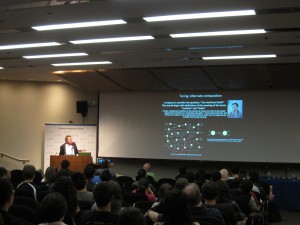-
Use of Technology in Dementia Care: Benefits and Ethical Considerations

A crisis has emerged in dementia care due to caregiver burden, high costs of care, and a growing aging population. Intelligent Assistive Technologies could be the answer to some of these problems, but they carry a unique set of ethical issues. How can we address these issues and use technology to improve dementia care?
-
The Healthy and Unhealthy Sides of Calorie Counting and Fitness Tracking Technology

This article is authored by Wendy York and Danny Rahal as part of the 2018 pre-graduate spotlight week. With the growing popularity of health-tracking technology, teaching students of all ages about nutrition and overall health has the potential to become a more interactive learning experience than ever before. Health-tracking technology, commonly in the form…
-
Highlights of “Building Minds”

For those who missed “Building Minds: Microchips & Molecules”, here is a taste of the action. For all who packed the CNSI auditorium in May for our annual interdisciplinary symposium, here is a quick trip down memory lane. Enjoy! Gimzewski (’15 symposium) UCLA’s James Gimzewski cited Alan Turing in his talk describing his research on…
-
How to Take Good Notes: Go Low-Tech

More and more students are opting to take notes on laptops to save trees and – they assume – take better notes. But is this assumption correct? According to the findings UCLA’s Dr. Danny Oppenheimer recently published in Psychological Science , these students are wrong: in a study of note-taking comparing handwritten to typed notes, Meuller…
-
How do we see so many colors on a digital screen?

How can we possibly perceive a world of colors from just red, green, and blue, the colors of lights in TV, computer, and phone screens? The answer has to do with the way our visual system is set up: We have three different kinds of cones in the retina which respond most to what we…
-
A New Direction in Autism Research: Google Cloud

Autism is everywhere and it is great! I’m not referring to the recent CDC estimate that 1 in 68 children in the U. S. are diagnosed with the disorder. Instead, I’m talking about its presence in the news. Most recently, I’ve read that the Vatican is holding an inaugural conference on autism, “The Person…
-
Graduate Program Interviews: Cognitive Psychology

So you applied to PhD programs in Psychology in the fall, with some kind of interest or focus in cognitive psychology – memory, attention, perception, thinking, learning, cognitive neuroscience, computational modeling of cognition, etc. Now interviews are coming up. Want to get the inside scoop on the interviewing/decision process? What questions to ask, what to…
-
Psychology in Action’s Women in Brain Sciences and Technology Event
Psychology in Action’s Outreach Program co-hosted a very successful awareness event on UCLA campus last quarter with UCLA’s Cognitive Science Student Association (CSSA). Geared towards inspiring and educating undergraduate women who are looking to pursue degrees in STEM-related fields, the Women in Brain Science and Technology Event saw over 45 undergraduate attendees. In a field predominantly…

